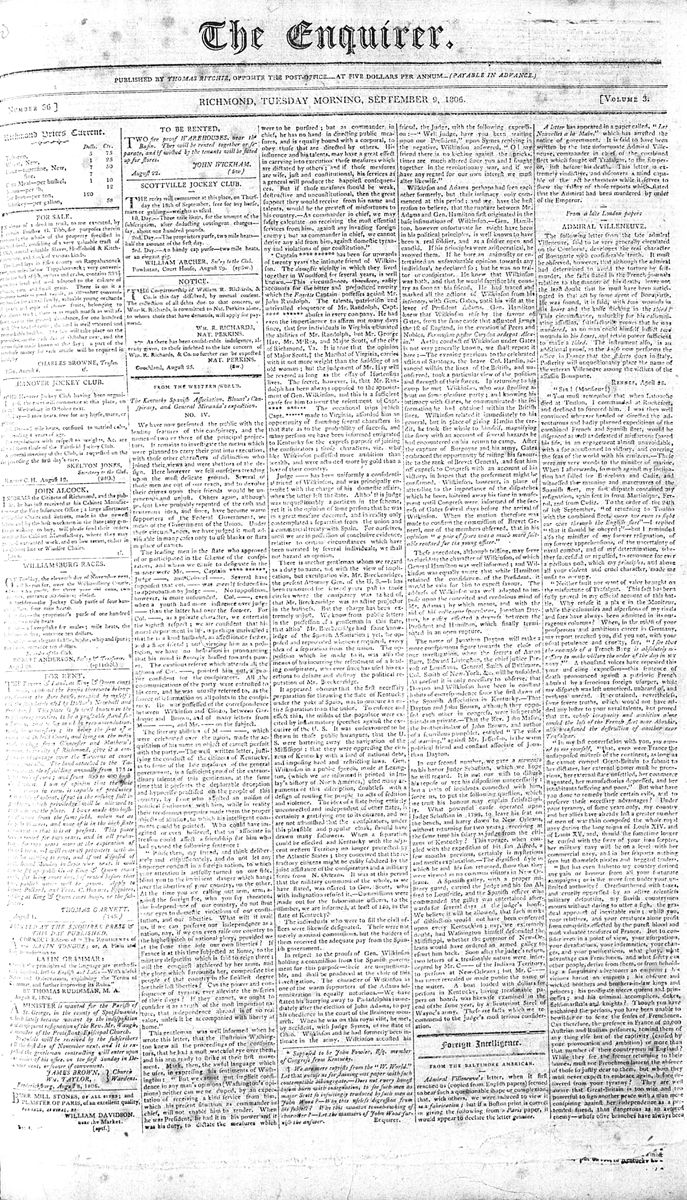Difference between revisions of "Richmond Enquirer, 9 September 1806"
| Line 1: | Line 1: | ||
[[File:RichmondEnquirer9September1806p1.jpg|link={{filepath:RichmondEnquirer9September1806.pdf}}|thumb|250px|Front page of the [https://catalog.swem.wm.edu/law/Record/827057 ''Richmond Enquirer''] for September 9, 1806.]] | [[File:RichmondEnquirer9September1806p1.jpg|link={{filepath:RichmondEnquirer9September1806.pdf}}|thumb|250px|Front page of the [https://catalog.swem.wm.edu/law/Record/827057 ''Richmond Enquirer''] for September 9, 1806.]] | ||
| − | On Friday morning, September 9, 1806, the ''Richmond Enquirer'' reported the results of the trial of | + | On Friday morning, September 9, 1806, the ''Richmond Enquirer'' reported the results of the [[Geroge Wythe Sweeney Trial|trial of George Wythe Sweeney]] for two counts of murder. A highly anticipated trial, the resulting verdict of 'not guilty' must have been disappointing, as evidenced by the last paragraph. |
The law at the time stated, 'Any negro or mulatto, bond or free, shall be a good witness in pleas of the commonwealth for or against negroes or mulattoes, bond or free, or in civil pleas where free negroes or mulattoes shall alone be parties.'<ref>Samuel Shepherd, ed., ''The Statutes at Large of Virginia, From October Session 1792, to December Session 1806, Inclusive, in Three Volumes, (New Series,) Being a Continuation of Hening'', Vol. 2 (Richmond, Virginia: Samuel Shepherd, 1835), 300.</ref> | The law at the time stated, 'Any negro or mulatto, bond or free, shall be a good witness in pleas of the commonwealth for or against negroes or mulattoes, bond or free, or in civil pleas where free negroes or mulattoes shall alone be parties.'<ref>Samuel Shepherd, ed., ''The Statutes at Large of Virginia, From October Session 1792, to December Session 1806, Inclusive, in Three Volumes, (New Series,) Being a Continuation of Hening'', Vol. 2 (Richmond, Virginia: Samuel Shepherd, 1835), 300.</ref> | ||
| Line 8: | Line 8: | ||
<blockquote><center><hr width="5%" /></center> | <blockquote><center><hr width="5%" /></center> | ||
| − | The District Court met in this City on Monday the 1st Instant.—Present Judges | + | The District Court met in this City on Monday the 1st Instant.—Present Judges Prentis and [[John Tyler Sr.|Tyler]]. |
| − | On Tuesday, came on the celebrated | + | On Tuesday, came on the celebrated [[George Wythe Sweeney Trial|trial of George W. Sweney]], on the charge of administering arsenic to his great Uncle the venerable [[George Wythe]]; P. N. Nicholas (attorney general, for the prosecution,) William Wirt and Edmund Randolph, Esqrs. council for the defendant. After an able and eloquent discussion, the jury retired, and in a few minutes, brought in the verdict of ''not guilty''. |
A similar indictment against him for the poisoning of [[Michael Brown|Michael]], a mulatto boy (who lived with Mr. Wythe) was quashed without a trial. | A similar indictment against him for the poisoning of [[Michael Brown|Michael]], a mulatto boy (who lived with Mr. Wythe) was quashed without a trial. | ||
Revision as of 11:26, 31 March 2014

On Friday morning, September 9, 1806, the Richmond Enquirer reported the results of the trial of George Wythe Sweeney for two counts of murder. A highly anticipated trial, the resulting verdict of 'not guilty' must have been disappointing, as evidenced by the last paragraph.
The law at the time stated, 'Any negro or mulatto, bond or free, shall be a good witness in pleas of the commonwealth for or against negroes or mulattoes, bond or free, or in civil pleas where free negroes or mulattoes shall alone be parties.'[1]
Article text, 9 September 1806
Page 3
The District Court met in this City on Monday the 1st Instant.—Present Judges Prentis and Tyler.
On Tuesday, came on the celebrated trial of George W. Sweney, on the charge of administering arsenic to his great Uncle the venerable George Wythe; P. N. Nicholas (attorney general, for the prosecution,) William Wirt and Edmund Randolph, Esqrs. council for the defendant. After an able and eloquent discussion, the jury retired, and in a few minutes, brought in the verdict of not guilty.
A similar indictment against him for the poisoning of Michael, a mulatto boy (who lived with Mr. Wythe) was quashed without a trial.
On a subsequent day, he was bro't up and convicted, on two of the indictments, which were found against him for the counterfeiting of his uncles' name to checks, drawn upon the Virginia Bank.
The pen yet lingers to add, that some of the strongest testimony exhibited before before called court and before the grand jury, was kept back from the pettit jury. The reason is, that it was gleaned from the evidence of negroes, which is not permitted by our laws to go against a white man.
References
- ↑ Samuel Shepherd, ed., The Statutes at Large of Virginia, From October Session 1792, to December Session 1806, Inclusive, in Three Volumes, (New Series,) Being a Continuation of Hening, Vol. 2 (Richmond, Virginia: Samuel Shepherd, 1835), 300.